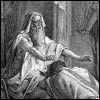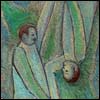"Jacob lived, etc." (Gen. 47:28)
We need to examine the criteria that cause the Torah to refer to Jacob sometimes as "Jacob" and other times as "Israel". It is a fact that when these names are applied to the Jewish people as a whole, the name "Jacob" reflects some deficiency in the Jewish nation, whereas the name Israel reflects the fact that the nation lived up to its potential on the occasions when it is described by that name. This principle has been alluded to in the Zohar p.210 on parashat Balak. The reason given there cannot be applied to Jacob the individual, however, inasmuch as he lived a righteous life at all times.
We must remember that Jacob strove to attain a very high degree of sanctity, one which is reflected in his name "Israel". Spiritual highs are attainable only when one simultaneously frees oneself of such human concerns as pain, anguish, anger, etc. The kind of sanctity Jacob strove for needed to be based on the attainment of a degree of serenity in his earthly life, something that we nowadays experience only on the Shabbat, a day that G‑d has imbued with the quality of rest. The Creator gave us an "additional" soul in order to appreciate that day to the full, and in order to help us to disregard all the depressing phenomena we have to deal with during the six days preceding the Shabbat. The reason we are able to do this is because rest emanates in the higher spiritual regions. This is why G‑d Himself called the Shabbat "oneg", meaning "delight".
Whenever Jacob experienced the kind of spiritual serenity we are meant to experience every Shabbat, he qualified for the name "Israel". The Torah therefore informs us about all these occasions by referring to him by his additional name. Whenever Jacob experienced worries, etc. this serenity departed from him similar to the departure of the additional soul from every Jew at the end of the Shabbat. At such times the Torah reverts to referring to our patriarch as being merely "Jacob".
[Selected with permission from the five-volume English edition of "Ohr HaChaim: the Torah Commentary of Rabbi Chaim Ben Attar" by Eliyahu Munk.]







Start a Discussion